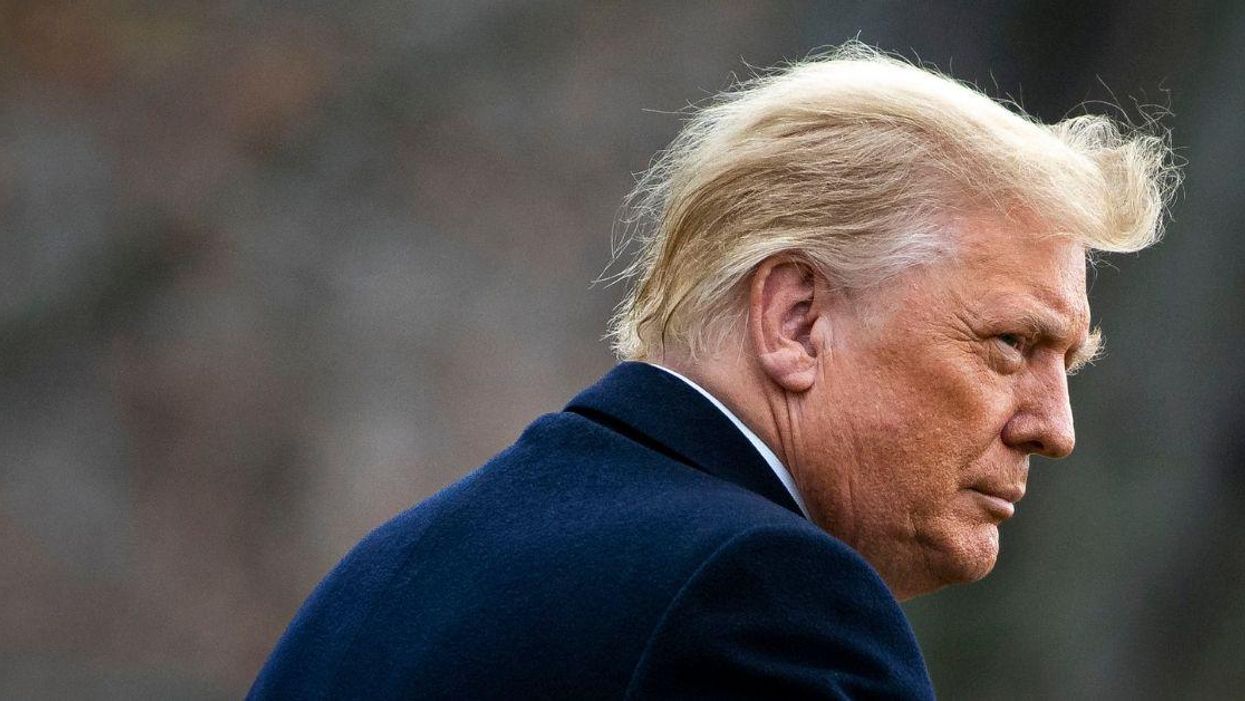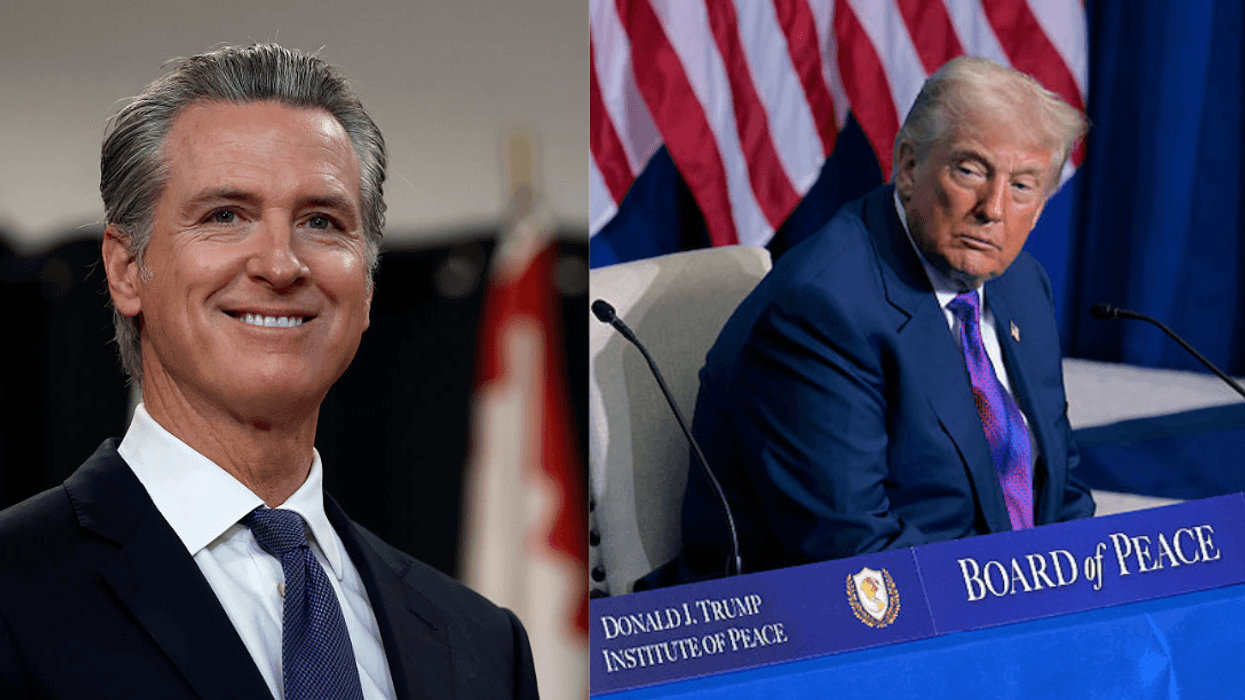No matter what happens, it seems President Donald Trump will continue claiming last month's election was stolen right up until the moment of Joe Biden's inauguration in January. And probably beyond.
After all, it's proven extremely lucrative.
But folks on the internet aren't about to let the claims slide. The President's latest tweet on the matter inspired a simple-yet-brutal historical fact check.
Yesterday, the President took aim on Twitter at Democrats' supposed willingness to let "stolen elections" slide.
But the President seemed to have conveniently forgotten about the 1876, 1888, 2000 election and the one in which he himself was elected in 2016. In each case a Democrat won the popular vote but lost the presidency to a Republican thanks to the electoral college.
Does Trump think that's how it works—he loses by 2,864,974 then by 7,058,909 votes, but the electoral college hands him the win anyway?
The 1876 contest between Democrat Samuel Tilden and Republican Rutherford Hayes is cited as the most controversial and contentious in United States history. 2020 might usurp that designation.
In 1888, incumbent Democratic President Grover Cleveland was certain he would win—and did with the populace—but Republican Benjamin Harrison was made President by the electoral college.
In 2000 former Democratic Vice President Al Gore faced Republican Geofge W. Bush. A messy recount ensued in the contested state of Florida—where Bush's brother Jeb was governor—due to inconclusive vote counts resulting from confusing ballot designs and "hanging chads."
The recount—halted and restarted multiple times by Jeb and Florida secretary of state and Bush campaign member Katherine Harris—led to the Florida results being decided by the Supreme Court.
The conservative Republican majority of the Court ordered the recount halted for good, delivering Bush the presidency by a margin of just 537 votes and leaving the actual results of the race unknown forever.
Despite this, Democratic candidate Al Gore chose to concede the election anyway "for the sake of our unity as a people and the strength of our democracy" after nearly two months of bitter strife.
As for 2016, numerous questions still remain as to exactly how the election may have been "stolen." But in the subsequent years, it was proven foreign meddling, especially from Russia—from hacking voting systems and illegal campaign funding to social media disinformation campaigns—had substantial Trump welcomed influence over its outcome.
Nonetheless, on the morning of November 9, 2016, Democratic candidate Hillary Clinton conceded the race, telling Americans that we "owe him an open mind and the chance to lead."
In short: For better or worse, the Democrats have hardly shown an unwillingness to "put up" with "stolen elections."
And folks on Twitter lined up in rapid succession to clue the President into the basic—and still recent—history of the country he leads.
Trump's latest fixation on supposed election fraud—for which his legal team and Justice Department could provide no evidence—comes as daily virus deaths have exceeded 3,000 and revelations that a new hacking operation resulted in Russia gaining access to nearly all the U.S. government's online systems.








 The Benny Show
The Benny Show





 @neilforreal/Bluesky
@neilforreal/Bluesky @savannahcat/Bluesky
@savannahcat/Bluesky @qadishtujessica.inanna.app
@qadishtujessica.inanna.app @v-ron/Bluesky
@v-ron/Bluesky @nelnelnellie/Bluesky
@nelnelnellie/Bluesky @beatlenumber9/Bluesky
@beatlenumber9/Bluesky @pinkzombierose/Bluesky
@pinkzombierose/Bluesky
 @theunobsolete/TikTok
@theunobsolete/TikTok @theunobsolete/TikTok
@theunobsolete/TikTok @theunobsolete/TikTok
@theunobsolete/TikTok @theunobsolete/TikTok
@theunobsolete/TikTok @theunobsolete/TikTok
@theunobsolete/TikTok @theunobsolete/TikTok
@theunobsolete/TikTok @theunobsolete/TikTok
@theunobsolete/TikTok @theunobsolete/TikTok
@theunobsolete/TikTok @theunobsolete/TikTok
@theunobsolete/TikTok @theunobsolete/TikTok
@theunobsolete/TikTok @theunobsolete/TikTok
@theunobsolete/TikTok @theunobsolete/TikTok
@theunobsolete/TikTok @theunobsolete/TikTok
@theunobsolete/TikTok @theunobsolete/TikTok
@theunobsolete/TikTok @theunobsolete/TikTok
@theunobsolete/TikTok @theunobsolete/TikTok
@theunobsolete/TikTok @theunobsolete/TikTok
@theunobsolete/TikTok
 @laysuperstar/TikTok
@laysuperstar/TikTok @laysuperstar/TikTok
@laysuperstar/TikTok @laysuperstar/TikTok
@laysuperstar/TikTok @laysuperstar/TikTok
@laysuperstar/TikTok @laysuperstar/TikTok
@laysuperstar/TikTok @laysuperstar/TikTok
@laysuperstar/TikTok @laysuperstar/TikTok
@laysuperstar/TikTok @laysuperstar/TikTok
@laysuperstar/TikTok @laysuperstar/TikTok
@laysuperstar/TikTok @laysuperstar/TikTok
@laysuperstar/TikTok @laysuperstar/TikTok
@laysuperstar/TikTok @laysuperstar/TikTok
@laysuperstar/TikTok @laysuperstar/TikTok
@laysuperstar/TikTok @laysuperstar/TikTok
@laysuperstar/TikTok @laysuperstar/TikTok
@laysuperstar/TikTok